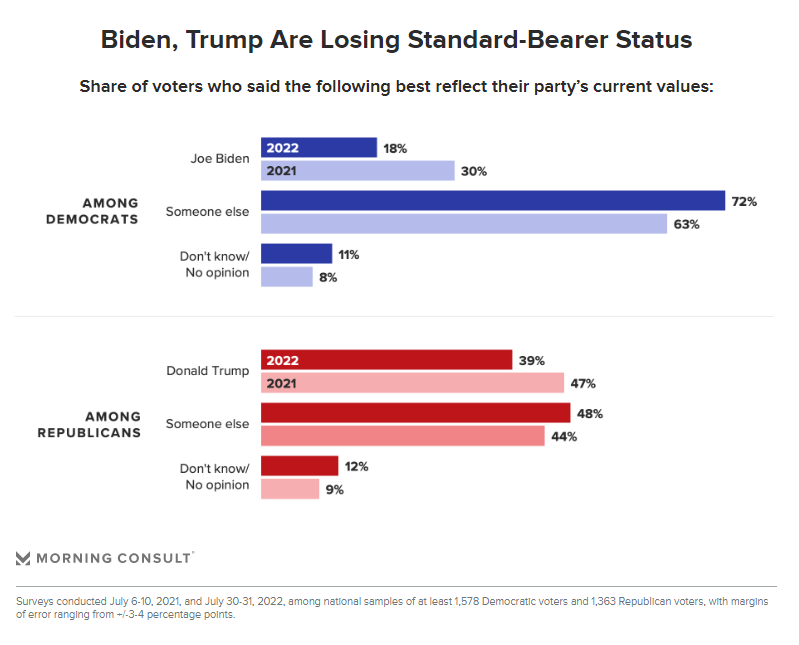The Big Sort, Continued
Axios has a fascinating survey out this week about which states Americans are considering moving to and why. Not surprisingly in our current culture, a lot of Americans are factoring some amount of partisanship into that decision. Here are some of their findings:
• Republicans were more likely to consider moving to red states (51 percent) than blue states (20%) or swing states (28%).
• Democrats were more likely to consider moving to blue states (48%) than red states (25%) or swing states (27%).
• More than half of Republicans (58%) and Democrats (55%) said they thought about moving to a state where the government better reflects their political and policy values, while 69% of Democrats and 65% of Republicans considered moving to a state that’s a closer match with their cultural and social values.
Of course, sitting in Connecticut dreaming of Florida isn’t the same thing as actually packing your bags—but some of these people will move over the next few years and the effect on our politics will almost certainly be more polarization and fewer competitive races. It will no doubt increase the temperature of debates around the Electoral College. And this type of sorting can’t be fixed by creating nonpartisan redistricting boards, because it’s Americans gerrymandering themselves.
Adrift and Frustrated
As political parties become less and less powerful (because of the 2002 Bipartisan Campaign Reform Act, which limited their money, which in turn limited their ability to maintain discipline from members), candidates become more powerful. But what happens when Americans don’t like their party’s candidates, either? From Morning Consult:

This is how junior factions within political parties gain power—whether it’s the Squad on the left or the Marjorie Taylor Greenes of the right. There is no one left to tell their voters: This is what we believe.
Depressing
I’m not sure I need to add too much to this graphic from Pew Research.

The NRSC Cuts Ads in Swing States
In a warning sign to Republicans this midterm cycle, the National Senatorial Campaigns Committee is canceling millions of dollars in ads in key Senate battlegrounds. And they’re doing it three months before Election Day.
“The cuts — totaling roughly $13.5 million since Aug. 1 — come as the Republicans’ Senate campaign committee is being forced to ‘stretch every dollar we can,’ said a person familiar with the NRSC’s deliberations. Republican nominees in critical states like Ohio, Pennsylvania and North Carolina — places the GOP must defend this fall — have failed to raise enough money to get on air themselves, requiring the NRSC to make cuts elsewhere to accommodate,” reports Politico’s Natalie Allison. “Since Aug. 1, the NRSC has cut ad buys in the battleground states of Pennsylvania ($7.5 million), Arizona ($3.5 million), Wisconsin ($2.5 million) and Nevada ($1.5 million), according to the ad tracking service AdImpact. Separately, a Democratic source tracking advertising buys estimated roughly $10.5 million in cuts by the NRSC since the first of the month.”
Woof. I’ve been saying that the GOP slouch in polls—particularly in some of the top tier Senate races—may in fact be a summer effect of asymmetrical media spending: Democrats made a strategic decision to run ads consistently and space out their spending to stay on air over the summer, but Republicans are going to concentrate their firepower in the fall, at which point you’ll see the polls tighten up again.
Buuuuuut this looks like a GOP that has too many seats to defend (no doubt because some of the candidates that got through the primaries aren’t as strong as hoped) and instead are going to be stretched thin even in their top tier races.
Ted Cruz Book Alert!
The Washington Examiner’s David Drucker had a story last week on GOP Sen. Ted Cruz’s presidential ambitions that’s very much worth the read: “Sen. Ted Cruz (R-TX) is prepping a $100 million campaign as he mulls reelection to the Senate or a run for president in 2024. Top of mind for the Texas Republican is former President Donald Trump; whether Trump mounts a third White House bid will influence Cruz’s next move. But one decision is firm: The senator will be on the ballot in 2024,” Drucker writes. “The senator is adding communications advisers, focusing on his podcast, Verdict, and, of course, publishing a book in September, the surest sign a presidential bid is under consideration.” You know who else has a book out? GOP Sen. Tim Scott of South Carolina, former New Jersey Gov. Chris Christie, and former GOP Rep. Will Hurd. We hear Sens. Tom Cotton and Marco Rubio have books in the works. So does Florida Gov. Ron Desantis.
So once again, I feel 2015 deja vu. Every Republican who gets in the race will argue that he is waiting for the field to narrow because he is the candidate who can beat Trump in a one-on-one. But Cruz of all people should see the folly in this game. In 2016, he was the last man standing against Trump, and it was too late. And also he wasn’t really the last man standing because Ohio Gov. John Kasich vowed to stay in the race until the convention—and then dropped out hours after Cruz lost to Trump in Indiana.
There need to be more downsides to running for president. As of now, it’s a great way to build your national fundraising base, increase your name ID, get a Cabinet position, and be taken seriously by the media and other elected officials in your party. The only problem is that those individual incentives are completely at odds with the needs of the party as a whole or American voters.
Schumer Weighs Into New York’s 12th District Democratic Primary
The New York Times’ Nicholas Fandos scooped yesterday that Senate Majority Leader Chuck Schumer of New York will endorse Democratic Rep. Jerry Nadler in his incumbent-on-incumbent primary against Rep. Carolyn Maloney. It’s a significant endorsement from “New York’s most powerful Democrat in Washington,” Fandos writes, in a race that pits two powerhouse Democrats against each other: Nadler, who chairs the House Judiciary Committee, and Maloney, who chairs the House Oversight and Reform Committee. The primary is next Tuesday.
A few weeks ago, we briefly discussed the question of how the end of the Roe v. Wade era was likely to affect midterm contests around the country. On the site today, Andrew has a piece digging into that question for one race in particular—the Georgia governor’s contest between incumbent Republican Gov. Brian Kemp and Democrat Stacey Abrams:
Abortion May Tip Opinion Polls, But It’s Not Sinking Brian Kemp’s Lead
In Georgia, public sentiment about abortion access was, until recently, pretty much split: Pew’s 2014 Religious Landscape Study reported that 48 percent of Georgians thought abortion should be legal in most or all cases, while 49 percent believed it should be illegal in all or most cases. But the data shows a significant shift since then in favor of legal abortion: In a poll last month, the Atlanta Journal-Constitution found that 42 percent of respondents said a candidate’s support for abortion access would make them more likely to support them, compared to only 26 percent who said they’d be more likely to support a candidate who promised to limit abortion access.
Even many Republican experts in the Peach State acknowledge the issue doesn’t favor their side these days. But for many Georgians, they argue, supporting abortion access is one thing, but riding that support into the voting booth to pull the lever for a Democrat is another: Abortion simply isn’t the deciding factor for enough people who would otherwise vote Republican to matter.
“Any polling will show you that Democrats in Georgia have an advantage if you look at abortion as a stand-alone issue,” GOP consultant Brian Robinson, a onetime aide to former Gov. Nathan Deal, told The Dispatch. But, Robinson added, “Republican have an advantage on immigration, gas, crime, and Biden. Georgia voters know about Dobbs and the heartbeat law, and Republicans running statewide have seen their leads hold steady.”
It’s easy to see that argument holding water in the marquee Kemp/Abrams matchup, where FiveThirtyEight’s polling average has shown Kemp holding a rocksteady lead of around 5.5 points over Abrams for the past five months.
The candidates themselves seem to tacitly acknowledge this dynamic, too. Since the heartbeat law went into effect, Abrams has sometimes tried to use abortion politics as a way to gain an edge on economic issues, as when she suggested to CNN earlier this summer that an abortion-unfriendly Georgia might be less attractive to business investment. She’s even made explicit pleas to economy-focused voters to care more about the issue: “Georgia is part of a nation that faces economic vicissitudes—things go up, things go down,” she said at a press conference last month. “But this law is permanent.”
And Audrey has a piece on House Minority Leader Kevin McCarthy’s evolving relationship with Liz Cheney:
The McCarthy-Cheney Split Comes to a Head in Tuesday’s Primary
Speaking before a crowd of roughly 50 to 60 Republican lawmakers and activists in the Capitol Hill Club on January 19, 2022, House Minority Leader Kevin McCarthy issued a rare defense of GOP Rep. Liz Cheney. According to two House Republicans who attended the lunch, McCarthy explained why he pushed back against House Freedom Caucus Chairman Scott Perry’s latest effort to boot her from the conference for her decision to sit on the select committee investigating January 6.
It was a politically pragmatic defense—not made on Cheney’s behalf but rather with his conference’s minority status in mind. Stripping her of her former title as House GOP conference chair—an effort he’d vocally supported in May of last year—was one thing. But kicking her out of the conference entirely, McCarthy argued, was inadvisable in that it would cut down the number of Republican committee seats in the lower chamber.
That Capitol Hill Club luncheon marked a strange moment in McCarthy’s fraught relationship with Cheney, his former leadership colleague whose reelection bid he has spent the past few months actively campaigning against. But McCarthy’s months-long vendetta against Cheney—a politically driven mission aimed at ensuring his rise to speakership should Republicans retake the lower chamber—is nearing its final blow.
Now roughly a year and a half after being censured by her own state’s GOP for her vote to impeach former President Donald Trump, Cheney will face her own voters in today’s Republican primary for the state’s at-large congressional seat. And the polls aren’t looking favorable for the three-term incumbent: In most surveys, she trails challenger Harriet Hageman by more than 20 points.
McCarthy is already relishing her widely anticipated loss at the Four Seasons in Jackson, Wyoming, where he’s helping fundraise for the National Republican Congressional Committee and the Congressional Leadership Fund. He’s spent the past few days from that perch making his case for Hageman, a 2020 election-denying candidate whom Trump has endorsed.
“This is unusual, but it’s an unusual situation, too. But Harriet is an amazing candidate,” McCarthy said in a Monday interview with Fox News of his support for Hageman—quite the turnaround for a minority leader who only two years ago praised Cheney as a “a powerful voice for conservatives.”
First elected to Wyoming’s sole congressional seat in 2016, Cheney has gone from serving as House GOP conference chair to a rank-and-file member now censured by the Republican National Committee and reviled by many of her House Republican colleagues.
On the top of that list of Cheney foes is McCarthy, who has for months urged Republican members to campaign against her reelection after she agreed to serve as vice chair on the House select committee investigating January 6. So pronounced is McCarthy’s disdain for Cheney that he rallied more than 100 House Republicans to co-sponsor a fundraiser for her Trump-backed opponent in March.









Please note that we at The Dispatch hold ourselves, our work, and our commenters to a higher standard than other places on the internet. We welcome comments that foster genuine debate or discussion—including comments critical of us or our work—but responses that include ad hominem attacks on fellow Dispatch members or are intended to stoke fear and anger may be moderated.
You are currently using a limited time guest pass and do not have access to commenting. Consider subscribing to join the conversation.
With your membership, you only have the ability to comment on The Morning Dispatch articles. Consider upgrading to join the conversation everywhere.